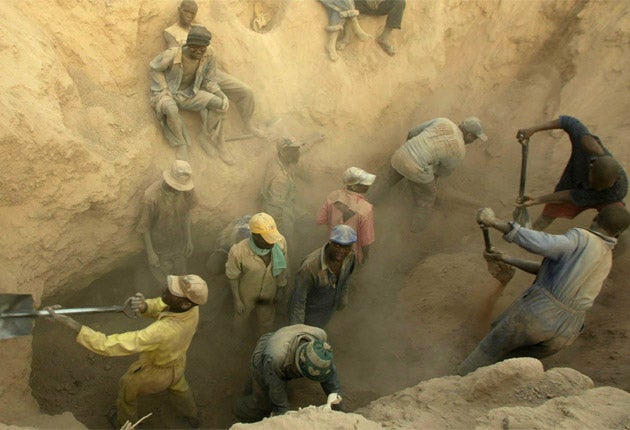Zimbabwe to escape censure over abuses in diamond mines
Key witness threatened as Mugabe regime mounts lobbying campaign

Your support helps us to tell the story
From reproductive rights to climate change to Big Tech, The Independent is on the ground when the story is developing. Whether it's investigating the financials of Elon Musk's pro-Trump PAC or producing our latest documentary, 'The A Word', which shines a light on the American women fighting for reproductive rights, we know how important it is to parse out the facts from the messaging.
At such a critical moment in US history, we need reporters on the ground. Your donation allows us to keep sending journalists to speak to both sides of the story.
The Independent is trusted by Americans across the entire political spectrum. And unlike many other quality news outlets, we choose not to lock Americans out of our reporting and analysis with paywalls. We believe quality journalism should be available to everyone, paid for by those who can afford it.
Your support makes all the difference.Zimbabwe looks set to escape any punishment over its trade in blood diamonds after a ruthless lobbying campaign by the Mugabe regime that has included threats and intimidation of a key witness at an international summit in neighbouring Namibia.
The member states of the Kimberley Process (KP) – the system set up to regulate the diamond trade – had been expected to use this week's meeting to impose an export ban on Zimbabwe after clear evidence of gross human rights abuses at its diamond fields.
However, campaigners now fear that Zimbabwe will be let off in a move that could permanently damage the credibility of what was a groundbreaking effort to break the link between gems and violent conflict in Africa.
The tactics employed by Harare have included attempts to intimidate Farai Maguwu, a campaigner from the mining district in eastern Zimbabwe, who travelled to the Windhoek summit to give evidence. Mr Maguwu, who runs the Centre for Research and Development in Mutare, said he has been followed since leaving the country and threatened by senior officials.
"My presence here didn't go down too well with them and they've had me followed," he told The Independent by telephone from the summit. "Even now when I'm speaking they are pushing closer to try and hear what I'm saying."
Mr Maguwu's organisation has been compiling evidence of wrongdoing in the Marange district, an area that has been steadily taken over by the military since major alluvial diamond deposits were found there three years ago. The diamond fields were seized from a British company, African Consolidated Resources, but it was the slaughter by the army of hundreds of itinerant miners that drew worldwide condemnation last year.
"There are strong people making money out of diamonds and they want to silence me," said Mr Maguwu. The researcher was summoned to a meeting with Zimbabwe's ambassador to Namibia on Monday where he says he faced hysterical accusations.
"He was screaming at me and calling me names, saying I was trying to please white people, saying I don't love my country... He's paid by the people who are looting our country. No one's paying me to be here," said Mr Maguwu.
The Kimberley safeguards agreed in 2003 helped to restore consumer confidence in precious gems. But earlier this year one of the architects of the KP, Ian Smillie, quit the scheme saying it was "in danger of becoming irrelevant" and "letting all manner of crooks off the hook".
Kimberley members agreed to send a mission to Zimbabwe last year after reports of abuses in the Marange fields. The delegation found evidence of a string of gross violations, giving hope to campaigners that the watchdog would act. "What is going on in Zimbabwe is against the spirit and the law of the Kimberley Process," said Annie Dunnebacke from Global Witness, one of the groups that takes part in the KP. "Member governments must agree to suspend Zimbabwe from importing and exporting rough diamonds."
The summit ends tomorrow. Last night Zimbabwe was referred to an oversight committee, the last step before any action would be taken. "It's been a small victory as at least there will now be a discussion," a source close to the talks said. "But the likelihood remains that no action will be taken."
Mr Maguwu said: "If they [the KP] can't act on the findings of their own mission then they really are no good for anything."
Rough trade: The diamond market
75 countries have signed up to the Kimberley Process
99.98 the percentage of rough diamonds subject to the regulations of the KP
10,000 number of artisanal miners working the Marange diamond fields in 2007
140 a conservative estimate of the number of miners killed by soldiers last year
500 the percentage increase year on year of Venezuelan diamond exports
Venezuela 100 per cent of Venezuela's diamonds are being smuggled out of the country, according to the UK-based group Global Witness.
Ivory Coast Ivorian conflict diamonds continue to be exported in spite of UN sanctions and are laundered into the legitimate Kimberley Process trade through neighbouring states and international trading centres.
Other offenders Guinea has reported an unfeasible 500 per cent increase in diamond production year on year; Lebanon is exporting more rough diamonds than it imports despite having no local deposits.
Join our commenting forum
Join thought-provoking conversations, follow other Independent readers and see their replies
Comments